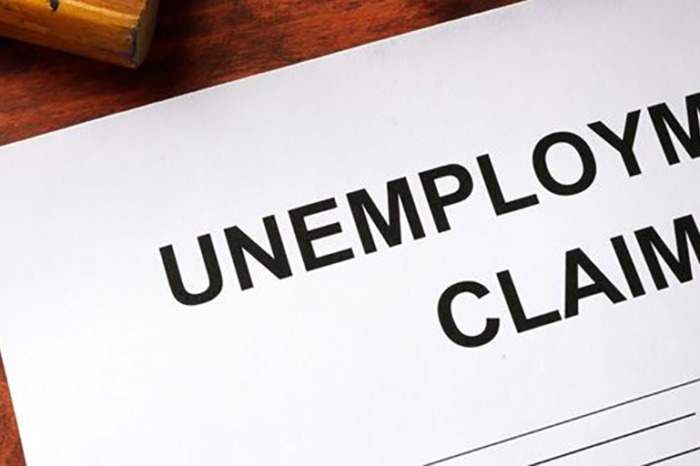Report: MA Likely to See Sharp Spike in Unemployment Rate
State should join others in lobbying Congress for large block grants to avoid severe fiscal crisis
BOSTON – The COVID-19 recession could cause Massachusetts’ unemployment rate to skyrocket to 25.4 percent by this June, according to a new policy brief published by Pioneer Institute. The Commonwealth’s unemployment rate was 2.5 percent in February.
“Massachusetts should join with other states to lobby Congress for large block grants to assist state governments during this unprecedented time,” said Greg Sullivan, co-author with Charles Chieppo, of Unprecedented Massachusetts unemployment projections set the stage for a state budget crisis. “The alternative is a state budget crisis of unprecedented severity.”
On April 2nd, the federal Bureau of Labor Statistics announced that 148,452 people in Massachusetts filed for unemployment insurance (UI) during the week ending on March 28, up from 4,712 during the first week of March. At 8.6 percent, the Commonwealth ranked sixth in the country in terms of the percentage of its total civilian workforce making jobless claims.
Nationally, the April 2nd jobs report found that 6.65 million people filed for unemployment insurance during the same week, more than double what many economists expected. As a result, the total number of Americans seeking unemployment benefits has increased by more than five-fold in just two weeks.
Even before the worse-than-expected jobs report, Federal Reserve Bank of St. Louis economist Miguel Faria-e-Castro estimated that national unemployment could rise to nearly 10 times the February 2020 rate of 3.5 percent. This would be both the highest rate and the fastest rise in U.S. history. Even during the Great Depression, it took four years for unemployment to increase from 3.2 percent before the 1929 stock market crash to 24.9 percent in 1933.
Faria-e-Castro predicts that the number of unemployed Americans will rise from 5.76 million in February to 52.8 million in June. If Massachusetts experiences a similar eight-fold increase in that time, about 975,000 state residents would be unemployed, which translates to a 25.4 percent unemployment rate.
More than a quarter of the workforce being unemployed would trigger a severe state budget crisis. In the Great Recession, during which Massachusetts unemployment rate peaked at 8.3 percent, the Commonwealth’s income tax revenue fell from $12.5 billion in fiscal 2008 to $10.1 billion in fiscal 2010.
Sales tax revenue declined by just 5 percent during that period, but the COVID-19 recession is fundamentally different because governments have effectively ordered non-essential businesses to close.
Massachusetts is expected to receive $2.67 billion from the recently enacted Coronavirus Aid, Relief and Economic Security Act. The legislation will also temporarily increase the federal matching rate for Medicaid, provide an additional $600 a week for up to four months to everyone collecting UI benefits, expand the categories of workers eligible for UI and fund an additional 13 weeks of benefits beyond the normal unemployment time limit.
This would help state finances because UI benefits are taxable. But the $1,200 rescue checks most adults will receive are not, and the law doesn’t help Massachusetts fund the usual 30 weeks of unemployment benefits.
“State block grants are a must,” said Pioneer Executive Director Jim Stergios. “Spending the Commonwealth’s $1.7 billion UI reserve or digging too deeply into the recently restored $3.3 billion rainy day fund would undermine our fiscal health and weaken our ability to conduct the people’s business.”
About the Authors
Gregory Sullivan is Pioneer’s Research Director. Prior to joining Pioneer, Sullivan served two five-year terms as Inspector General of the Commonwealth of Massachusetts and was a 17-year member of the Massachusetts House of Representatives. Greg is a Certified Fraud Investigator, and holds degrees from Harvard College, The Kennedy School of Public Administration, and the Sloan School at MIT.
Charles Chieppo is a Pioneer senior fellow. Previously, he was policy director in Massachusetts’ Executive Office for Administration and Finance and directed Pioneer’s Shamie Center for Restructuring Government. While in state government, Charlie led the successful effort to reform the Commonwealth’s public construction laws, helped develop and enact a new charter school funding formula, and worked on state workforce issues such as pension reform and easing state restrictions against privatization.
About Pioneer
Pioneer Institute is an independent, non-partisan, privately funded research organization that seeks to improve the quality of life in Massachusetts through civic discourse and intellectually rigorous, data-driven public policy solutions based on free market principles, individual liberty and responsibility, and the ideal of effective, limited and accountable government.
Get Our COVID-19 News, Tips & Resources!
Related Content














